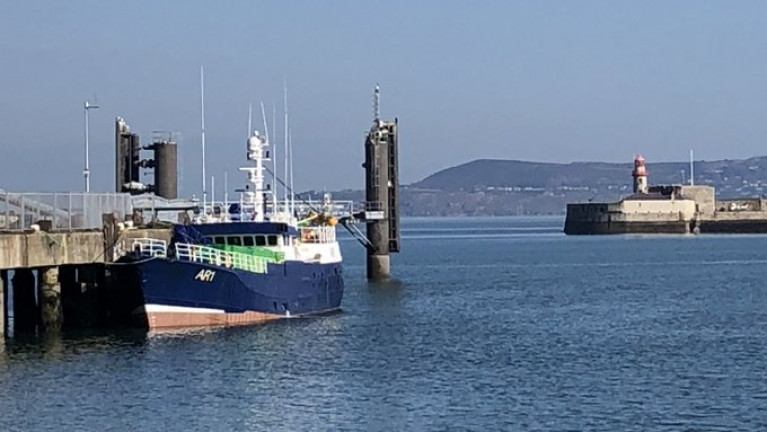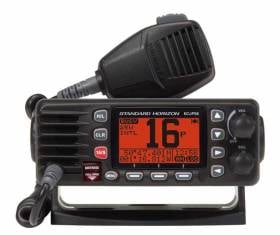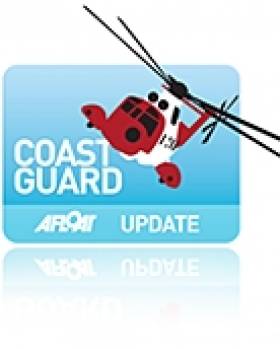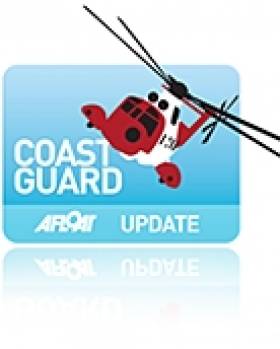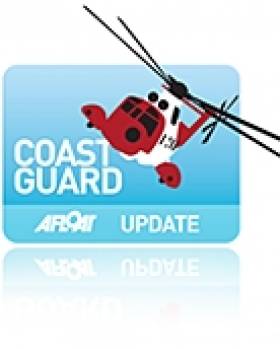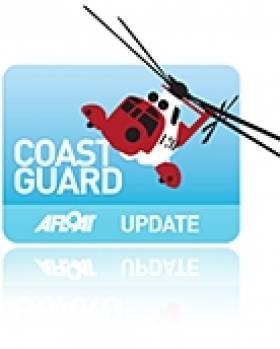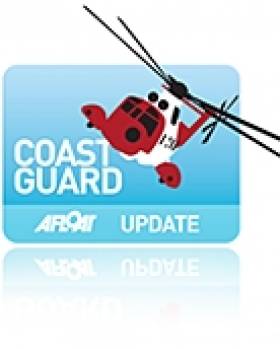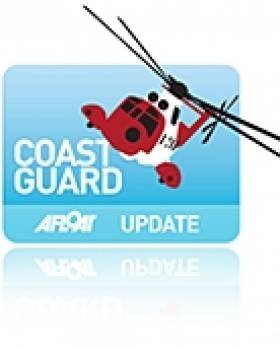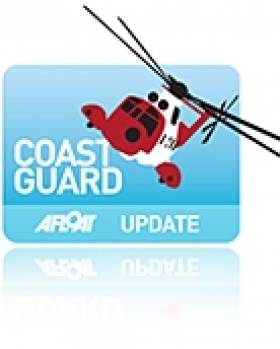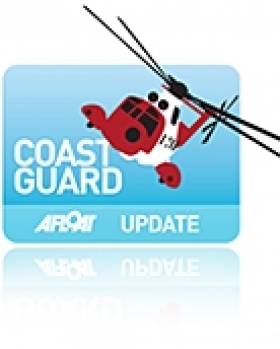Displaying items by tag: UK coastguard
Indonesian sailors stranded on a trawler in Dún Laoghaire Harbour since early March, as Afloat reported, are on their way home after their repatriation terms were agreed.
The 14 sailors left the Magan D shortly before 8am and were accompanied to Dublin Airport by a garda escort.
The Spanish-owned British registered trawler was towed into Dún Laoghaire three weeks ago after drifting for several days in the Irish Sea because of engine failure.
It was detained by the UK Maritime and Coastguard Agency
The Indonesian crew had been working on the ship since July last year but had not been paid since January.
More from RTE News here.
Reminder For Upcoming UK Coastguard VHF Channel Changes
#VHF - UK Coastguard is reminding all boat owners, shipping companies and anyone who puts out to sea to make sure they are ready for the pending changeover of some VHF channels used to contact emergency services.
As reported earlier this year on Afloat.ie, changes to Appendix 18 (Marine VHF) of the Radio Regulations it will mean that VHF channels 23, 84 and 86 will no longer be used for either Maritime Safety Information (MSI) or Radio Medical Advice.
The channels to use from next month (September 2017) will be VHF 62, 63 and 64. The use of VHF Channel 10 for MSI and pollution control (back up) is unchanged.
“This is an absolute changeover so people do need to be ready to start using the channels from 10am on 6 September,” said Mark Lawson from the Maritime & Coastguard Agency.
“Although the MCA will keep the existing channels for about a year, they will not be routinely monitored. Your existing VHF radios should already have the new channels, but owners should check.”
Why are the channels changing?
The changes are as a result of the World Radio Conference where it was decided that some channels should be removed and allocated for digital use. It’s a simple change to other VHF frequencies.
What difference will it make to boat owners and operators?
There will be no difference to the service provided. MSI broadcasts will still go out at the existing published times, just on the new channels. Those listening on Channel 16 will be directed to the appropriate channel, when the forthcoming broadcast is to be made.
What will happen if I use the old channels after 6 September?
The old channels will be retained by the Maritime & Coastguard Agency for about a year. However, they will not be routinely monitored as the MCA will redirect people to the appropriate channel that the MSI broadcast will be made on. Boat owners requiring Radio Medical Advice should initially call on Channel 16. They will then be directed to a working channel (62, 63 or 64).
What should boat owners and operators be doing?
Make a note of the replacement channels so that they are ready for the changeover day. Your existing VHF radios should already have the new channels, but owners should check.
Reprieve for Holyhead Coastguard a 'Victory for People Power'
A former mayor of Holyhead has sung the praises of Holyhead's coastguard station to Afloat.ie.
Commenting on our recent report on plans to close Liverpool's coastguard station, Cllr KR Roberts said it was "a victory for people power" that Holyhead in north Wales joins Bangor in Northern Ireland among those stations reprieved under revised proposals for the streamlining of Britain's coastguard network.
"Holyhead Coastguard covers a vast area of the Irish Sea in close proximity to the Irish coast, where it joins forces with their Irish Coast Guard colleagues to provide a service of maritime safety to both commercial vessels and leisure craft alike," said Cllr Roberts.
"Holyhead Coastguard also provide maritime safety cover to over 300 miles of Welsh coastline that welcomes a vast variety of leisure craft from Ireland.
"As a past mayor and local councillor in Holyhead I am proud to promote the long traditions of maritime connections between Wales and Ireland. However I am sorry to see the loss of any coastguard station - in this case Liverpool Coastguard, which provides maritime safety cover to the northwest coast of England and the Scottish borders around the Solway Firth."
Cllr Roberts added that these areas would be taken over by Holyhead "with resilient support from Belfast and Milford Haven Coastguards".
Concerns Over Belfast Coastguard Jobs
Concerns persist over the future for Northern Ireland’s coastguard service staff - despite the British government backing down from plans to close the Bangor search and rescue centre.
As previously reported on Afloat.ie, the Bregenz House station was given a reprieve under revised proposals to streamline the UK's coastguard network.
However the coastguard workers' union told the Belfast Telegraph that assurances must still be given to preserve "the same level of service”.
Ian Graham of the Public and Commercial Services (PCS) union said: "The numbers they’re quoting in the proposals are not providing this service with enough staff.
"Lives are still at risk with these proposals, there isn’t one UK coastguard I have spoken to that doesn’t disagree with that. We need to keep fighting to safeguard the service. This was a small victory.”
The Belfast Telegraph has more on the story HERE.
Liverpool Coastguard Closure 'Will Put Safety at Risk'
A British MP has criticised plans to close Liverpool's coastguard station as 'dangerous'.
The Liverpool command centre - which also covers the Irish Sea - is one of eight that face the axe under revised proposals to streamline Britain's coastguard network that saved Belfast's search and rescue station from the axe.
Wirral MP Angela Eagle said the move "is all about saving money, not safety" and "will put safety at risk".
She told the Wirral Globe: "There’s still 12 weeks of consultation. But there real issues which need to be addressed. For example, a coastguard operator based in Northern Ireland will know nothing about what’s going on in Liverpool Bay.
"We have a huge maritime history and it’s being eroded by these cuts.”
The Wirral Globe has more on the story HERE.
Bangor's Future 'A Victory for People Power'
The decision to keep open Northern Ireland's only dedicated search and rescue base is a victory for people power, says the Belfast Telegraph.
As previously reported on Afloat.ie, the station at Bangor was saved from closure following a review of plans to streamline the UK's coastguard network.
In an editorial on Friday, the paper said: "Northern Ireland really is a place apart geographically and no-one was convinced that the waters around our coastline from Lough Foyle to Strangford and the inland waterways of Lough Neagh and Lough Erne could be safely monitored by what amounted to remote control if Belfast Coastguard was closed."
The preservation of the service at Bangor is also "a victory for common sense".
The paper added: "From now on every person plucked from the sea or the loughs will utter a heartfelt thanks to those who fought to keep the service locally-based and they will also praise Transport Minister Phillip Hammond for sparing it from closure."
Bangor Coastguard Centre Saved from the Chop
Northern Ireland's only dedicated search and rescue command centre has been saved from closure following a review of plans to streamline the UK's coastguard network.
BBC News reports that UK Transport Minister Phillip Hammond told the House of Commons today that the coastguard station at Bangor would remain open and operate 24 hours a day, allaying concerns that the station would be reduced to daytime-only service.
"Had this decision gone the wrong way, it would not simply have been a blow for the staff here in Bangor, but for all of Northern Ireland," commented North Down MLA Peter Weir.
The Bangor station will be one of eight full-time centres across the UK that remain open, while the stations at Clyde, Forth, Portland and Liverpool will be closed.
BBC News has more on the story HERE.
Search and rescue operations from Northern Ireland's only dedicated coastguard centre are on the increase, the Belfast Telegraph reports.
The latest figures show that there were 50 per cent more callouts to the Bangor-based centre last year than in 2006.
Shipping Minister Mike Penning - who is behind controversial plans to streamline the UK's coastguard network, which could see Bangor either closed or reduced to daylight operation - also confirmed that more than a third of callouts were made at night.
As previously reported on Afloat.ie, the final decision on the coastguard proposals will be taken by 19 July.
Decision on UK Coastguard Cuts Next Month
The final decision on plans to streamline the UK's network of coastguard centres will be taken next month, the News Letter reports.
As previously reported on Afloat.ie, the station at Bangor - Northern Ireland's only 24-hour search and rescue co-ordination centre - is at risk of closure under the proposed cuts.
Shipping Minister Mike Penning says the decision will be announced on 19 July, following the report of the Commons Transport Select Committee next week, after which a second consultation period will begin.
He reportedly told a Westminster debate last week that "no change is not an option".
Northern Ireland MPs voiced their opposition at the debate to any reduction of service at Bangor, with David Simpson of Upper Bann saying that it "would have a significant effect on the levels of service and rescue".
The News Letter has more on the story HERE.
UK Minister Grilled Over Coastguard Closures
The UK Shipping Minister has hit out at claims that Northern Ireland coastguards were barred from speaking to the Commons committee looking into plans to streamline the British coastguard network.
According to the Belfast Telegraph, Minister Mike Penning maintained he had "not gagged anybody" when questioned over his forbidding officers from a number of coastguard stations - including Bangor - from giving testimony to the transport committee.
The minister explained his decision on the basis that coastguards are civil servants and that "a civil servant's job is to support the government of the day".
He also indicated to the inquiry panel that he was working towards keeping open 10 stations instead of the eight listed in the original plans, under which Bangor would either be downgraded to a daytime station or closed outright.
The Belfast Telegraph has more on the story HERE.


























